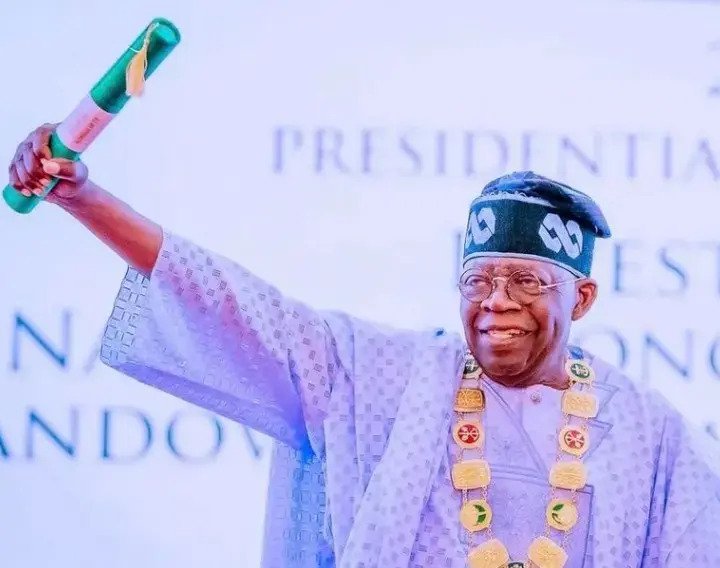Bola Tinubu of the All Progressive Congress (APC) has just been inaugurated as the 16th Democratic elected president following his victory at the controversial Feb 25th presidential election. His road to victory at the poll was laced with several controversies, including his state of health and his involvement in illicit drugs.
The former senator and governor of Lagos state who took the baton of leadership today swore during his inauguration that “I will be faithful and bear true allegiance to the Federal Republic of Nigeria that I will preserve, protect and defend the constitution of the Federal Republic of Nigeria. So, help me, God,” a mark that has signified the commencement of his four years journey towards fulfilling his plans and promises contained in his 80 page manifesto tiled ‘Renewed Hope’ made available to Nigerians during his campaign.
The highlight of Tinubu’s plans for the country as contained in his manifesto are: “Build a Nigeria, especially for our youth, where sufficient jobs with decent wages create a better life Manufacture, create, and invent more of the goods and services we require. Nigeria shall be known as a nation of creators, not just of consumers. Export more and import less, strengthening both the naira and our way of life. Continue assisting our ever-toiling farmers, through enlightened agricultural policy that promotes productivity and assures decent incomes, so that farmers can support their families and feed the nation.
“Modernise and expand public infrastructure so that the rest of the economy can grow at an optimal rate. Embolden and support our young people and women by harnessing emerging sectors such as the digital economy, entertainment and culture, tourism and others to build the Nigeria of tomorrow, today. Train and give economic opportunity to the poorest and most vulnerable among us. We seek a Nigeria where no parent is compelled to send a child to bed hungry, worried whether tomorrow shall bring food.
“Generate, transmit and distribute sufficient, affordable electricity to give our people the requisite power to enlighten their lives, their homes, and their very dreams. Make basic healthcare, education, and housing accessible and affordable for all. And, most importantly, establish a bold and assertive policy that will create a strong yet adaptive national security architecture and action to obliterate terror, kidnapping, banditry, and all other forms of violent extremism from the face of our nation.”
However, how realistic some of these plans are is a major concern, especially with the high level of insecurity and debt inherited from the Buhari led administration. Avalaible statistics by the Nigeria Security Tracker (NST), a project of the Council on Foreign Relations Africa program, which documents and maps violence in Nigeria that is motivated by political, economic, or social grievances, puts Buhari’s regime to have recorded 61,896 deaths in 8 years.
Also, At the inauguration of President Muhammadu Buhari’s administration in 2015, the country’s debt stock had continued to soar, rising from N12.6 trillion to over N80 trillion as his administration kept on burrowing to fund yearly budget deficits.
Despite these, Segun Olakoyenikan, a financial analyst, who reacted to the feasibility of Tinubu improving the economy despite failed policies and huge debts from the previous administration said that Tinubu through some of his policies disclosed, including the removal of fuel subsidy, is ready to upturn the economy.
He argued that Nigeria has been held back a lot because of fuel subsidy and the huge payment disbursed to fuel the policy and if removed as hinted by Tinubu will increase investments in other key areas, including education and health.
“Some of the arguments against subsidy payment is that we are not actually subsidizing for people who deserve it and there are a lot of loopholes in the system, so by removing the subsidy, Nigeria can save as much as 4 trillion naira in a year, which of course can be diverted into other areas of urgent needs such as our education, health sector, and other key sectors. That policy if well pursued can wrap up investment in those areas over the next four years” he said.
On the exchange rate alignment policy, Olakoyenikan praised the proposition and said a unified exchange rate will provide clarity for investors both local and international so they know what to expect in and out of the market.
While expressing concern over the effect this policy could have he said: “They have some serious consequences on how we forge ahead a nation because when you have an alignment of foreign exchange, you definitely will not see naira exchanging with the dollar at #400/500, we might see some price adjustment, there will be a level, a middle ground where the premium is spread between the official and the parallel market rate can be narrowed and probably they can find a balance, an equilibrium point somewhere in the middle, but be rest assured that if that policy is followed through, we won’t be seeing something as cheap as 400 to a dollar.”
He, however, disagreed with the plans to adjust the interest rates as proposed by Tinubu as it would increase the prices of goods and make it cheaper for the government to borrow, which will increase the debt profile of the country.
